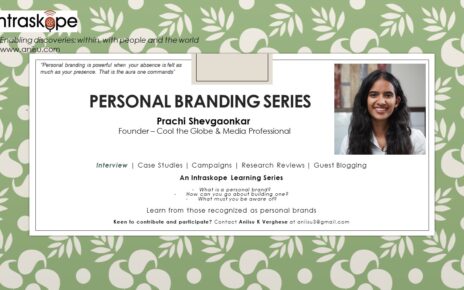In his book, To Sell is Human, Daniel Pink explains that we are all in ‘sales’ no matter what we do as a profession or as individuals. From trying to pitch an idea to garnering support for a family decision, there are elements of ‘influencing’, ‘convincing’ and ‘persuasion’ in these interactions. However, he calls out that by thinking of the other (attunement), our ability to bounce back from rejection (buoyancy) and our strength in making meaning of information (clarity) allows us to be relevant and of value to the world. All of this is easily achievable by you and me. The obsession with influencers and believing ‘they’ can do ‘more’ is debilitating.
In a recent study by Wave across 80 countries and with 56000+ active internet users found that just 4% trusted influencers, trust declined by 8% from earlier studies and 63% said that more than 50% of the information they get from bloggers and vloggers is not true. The lack of transparency and the epidemic of fake followers and scams have led to this distrust. Therefore, the usage of the word ‘influencer’, according to me, is overused and probably abused. Each one of us are persuaders in our own rights – we don’t need to put labels on some people just because they have more ‘followers’, do ‘paid’ promotions and are expected to have more clout.
Look at these research-led insights:
- The State of the Influencer Marketing 2020 – Benchmark Report informs us that among the nano (1k-10k followers), micro (10k-100k), medium (100k-1m) or mega (1m+ followers) influencers, the nano influencers have the most engagement across channels like Instagram, Facebook, You Tube and Twitter!
- In a study of public perceptions of personality, social media influencers were known to be “verbal, smart, ambitious, productive, and poised” and “more likely to be sought out for advice and reassurance and more likely to give advice than CEOs” (Freberg, K., et al. p.2). These traits aren’t too different from what people like you and me aspire to be and already have as traits, right?
- Also, according to the Edelman Trust Barometer (2020) study, “people like yourself” are more trusted than the CEO. More importantly, a study among consumers about their ability to consider influencer recommendations indicated that “just 31% saying that influencers need to be experts in order to be authentic.
- You don’t need to know the ins and outs of everything as an influencer (Rakuten, 2019), but you do need to be passionate about what you’re speaking to and provide good recommendations in that realm. Consumers stop following influencers when they aren’t aligned with their core values.
All this points to the fact that each of us are already persuaders in our own rights. Also, looking at followers only is flawed, and we need to avoid our obsession with popularity and focus on relevance and authenticity.
Knowing what you stand for and sharing with the community is reflective of an individual’s personal brand, which each of us can manage if we know what we stand for and what matters for people around us.
Investing in your own personal brand doesn’t start with social media. It begins within you. With your values and the process of building a personal brand is inside-out. Social media is one part of our lives and giving a lot of importance to influencers demeans who we are as a society and who you stand for with your identity.
The Linkedin Social Selling Index calls out 4 themes which gives a cumulative understanding of the impact your influence has – establishing your professional brand, the ability to find people, engaging with insights and building strong relationships. What’s interesting is that this index requires one to be continually working on your selling prowess and not ‘act once and forget it’ hoping the ‘charm’ will work forever. This means, investing in adding value to the network, fueling their growth and progress and investing in your capabilities.
So, there is hope. We need to trust ourselves to begin. The world needs authenticity more than ever and that can only happen when we stand for something meaningful and be true to what we stand for. When we create a sense of belonging, we are truly connected. Lastly, we all have the capacity as normal ‘people’ to build those trusted connections, engage others like ‘humans’ and create memorable experiences.



